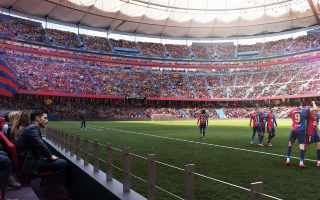Spain: Luxury matchday experience and controversies around the Camp Nou pitch
source: StadiumDB.com; author: Paulina Skóra
 FC Barcelona, together with the renovation of Spotify Camp Nou, introduced an innovative concept aimed at completely changing how football is experienced – Barça Hospitality. This new approach is not just about watching the game but living it in a unique, emotional way.
FC Barcelona, together with the renovation of Spotify Camp Nou, introduced an innovative concept aimed at completely changing how football is experienced – Barça Hospitality. This new approach is not just about watching the game but living it in a unique, emotional way.
Advertisement
Huge interest in Barça Hospitality offer
Thanks to inspiring modernization, Spotify Camp Nou is set to become a global benchmark not only for sports venues but also for modern entertainment spaces. The stadium will be alive 365 days a year, offering not just matches but immersive and unique experiences that go far beyond sport. A key part of this transformation is Barça Hospitality – a revolutionary offer featuring 9,400 VIP seats, both fixed and convertible. That’s three times more than the old Camp Nou, putting the new arena among the venues with the largest number of exclusive spots worldwide.
The high sales performance of VIP packages is already visible in sold-out products such as Suites & Boxes, Loge Seats, and the exclusive Player Zone. The remaining options available in limited quantities include VIP Ring Seats, Balcony Seats, and Pitch Row. VIP Ring Seats provide panoramic views from the first VIP ring, direct access to VIP lounges, and an exclusive atmosphere. Suites & Boxes, now sold out, offered unparalleled VIP experiences for companies and their guests, with private boxes for 12 people and personalized service.
Player Zone, also sold out, guaranteed the closest possible contact with players and the coach, access to the Pitch Club Lounge, exclusive catering, and views of the exit tunnel and interview zone. Pitch Row offers the most thrilling seats in the front row, giving fans an almost on-pitch feeling. Loge Seats, designed for groups of four, feature comfortable sofa-type seats in the first VIP ring with access to private lounges right behind. Balcony Seats, limited in availability, are located on the second tier and also provide access to VIP areas with dedicated catering.
Attention to every detail
All these seats are placed in the best locations in the stadium, with direct access to exclusive lounges and hospitality zones. The design ensures that the entire experience – from entering to leaving the stadium – is much more than just 90 minutes of football. To guarantee the success of this transformation, FC Barcelona partnered with Legends – a global company experienced in managing commercial operations at the world’s top sports venues. This collaboration ensures the highest standards in designing and selling the hospitality offer – from the most exclusive seats to catering and VIP zones. The goal is to attract both the most loyal fans and corporate or individual clients seeking to enjoy matches in luxurious settings and a special atmosphere.
They planted the grass... but why?
Recently, FC Barcelona released photos and videos of the newly sown pitch, even though no matches will be played on it soon. This can be seen in two ways: on one hand, it’s a way to keep fans hopeful and excited; on the other, it might be a marketing move. Inside the club, the league season’s start is still seen as the key date, but mid-September after the first international break is equally realistic. The good news is that work can continue under extended hours at least until the end of the month.
Those who have seen the pitch in person talk about unevenness, small bumps, and lime lines that aren’t perfectly straight. Both the club and construction company agree it will take about two months from sowing before the pitch can be used for matches. That means the ball might roll there only in about four months.
Tweet Obras Camp Nou https://x.com/obras_camp_nou/status/1923032145821368523
— Obras Camp Nou (@obras_camp_nou) June 28, 2024
An expert from a leading hybrid grass company, whose turf will be used at Camp Nou, says that laying the grass now has no technical justification. In his view, it’s an unusual and somewhat pointless move since the grass will be exposed to dust and construction debris, meaning it will need replacing before games begin. The expert also predicts that if Barça returns to Camp Nou next year, the club should expect multiple pitch replacements during the season, each costing roughly €300,000.
Marketing stunt or financial move?
There is, however, a possible technical explanation: Garden Tona, the company, first plants natural grass and later introduces artificial fibers. This method allows replacing only the natural layer if needed, using special machines. Behind this move could also be a financial aspect. The current auditor (Crowe Spain) did not include VIP revenues from Camp Nou in financial forecasts, which might complicate Barça’s compliance with financial fair play rules. The previous auditor, Abauding SL, temporarily recognized these revenues, helping the club meet the standard in January. For LaLiga and auditors, the visual impression that Camp Nou is almost ready might be crucial to validating these revenues.
Tweet Obras Camp Nou https://x.com/obras_camp_nou/status/1921979414364991636
— Obras Camp Nou (@obras_camp_nou) June 27, 2024
Advertisement
 StadiumDB
StadiumDB